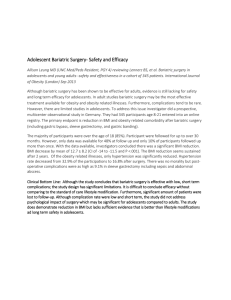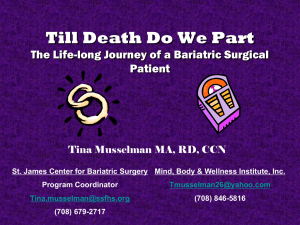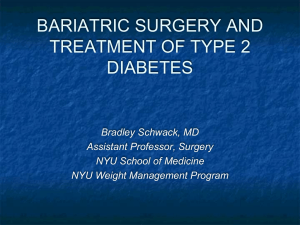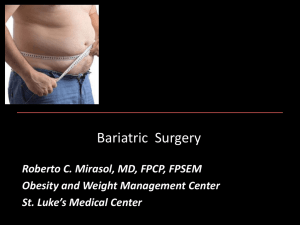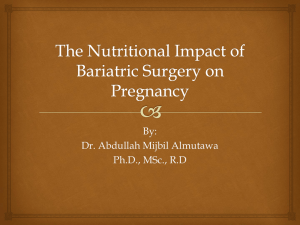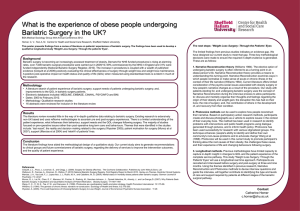Bariatric Surgery and Pregnancy
advertisement
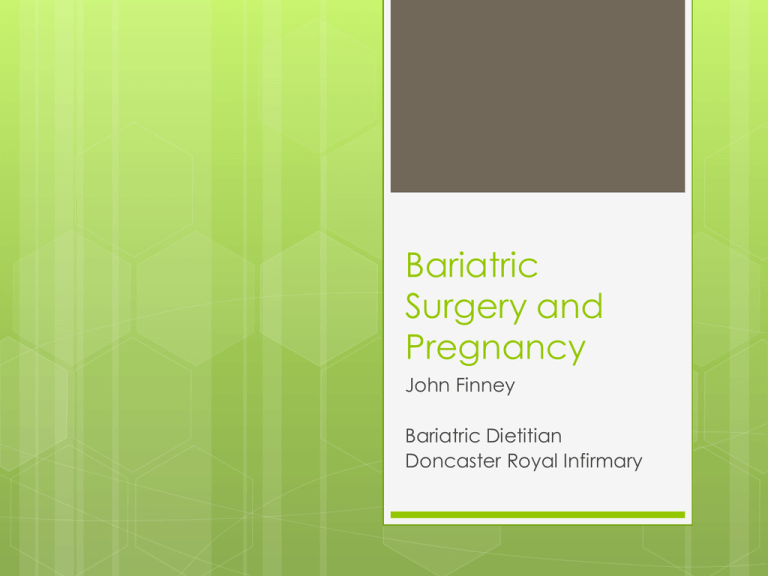
Bariatric Surgery and Pregnancy John Finney Bariatric Dietitian Doncaster Royal Infirmary Discussion Points Obesity Bariatric in Pregnancy Surgery Gastric Bypass Gastric Band Sleeve Gastrectomy Post op diet Bariatric Surgery and Pregnancy Recommendations Areas of Limited Evidence Gestational Diabetes Case studies Obesity Global epidemic (WHO, 2000) Obesity rates in the UK continue to rise (HSE, 2012) Obesity prevalence in women of reproductive age 24.2% and expected to rise (Ono, 2005) Obesity Bariatric surgery is an effective tool for treating obesity (Shah, 2006) Many co-morbidities can improve following weight loss surgery (Perry, 2008) Significantly more women than men have bariatric surgery Many of these women are of a reproductive age Obesity in Pregnancy Prior to conception associated with infertility Increases risks in pregnancy Maternal death Gestational diabetes Pre eclampsia Hypertension And many more ……… Criteria for Referral New Clinical Commissioning Policy Published April 2013 NICE guidance (2006) BMI >40kg/m² Or 35-40kg/m² with other significant disease Obesity present for at least 5 years Complied with a local specialist MDT obesity service weight loss programme for 12-24 months (for BMI>50kg/m2, minimum period is 6/12) Keyhole Surgery Gastric Bypass Surgery Gastric Bypass Gastric Bypass Complications Leak from the joins Narrowing or blockage Nutritional deficiencies Gastric Band Surgery Gastric Band Gastric Band Complications Band slippage Band erosion Infection Port disconnection Band leakage Sleeve Gastrectomy Sleeve Gastrectomy Sleeve Gastrectomy Complications Staple line leak/bleed Narrowing or blockage Nutritional deficiencies Post Operative Diet Following Bariatric Surgery Post surgery staged process to allow the body to get used to the operation let swelling decrease Not put excessive pressure on joins / dislodge bands Individual time spent at each stage depends on procedure and the patient is progressing Important not to rush through the stages, it will take longer in the end Post Operative Diet Following Bariatric Surgery • Four Stages Stage 1 Liquid only (1 week) Stage 2 Blended / Pureed textured diet Post Operative Diet Following Bariatric Surgery • Four Stages Stage 3 Soft diet Stage 4 Normal textured diet Pre Op Guidance for Post Op Success Regular meals Control snacking Healthy choices – long term small portions Speed – important to eat slowly – 15 – 20 minutes to eat a meal Chewing – chew well, 20 – 30 times Drinking and eating – avoid Fizzy drinks – reduce and avoid Physical activity Vitamin and Mineral Supplements % Excess Weight Loss Overall % Excess Wt Loss Seminar 6m 12 m 24 m 0 10 20 % 30 Gastric Bypass 40 50 Sleeve Gastrectomy 60 Gastric Band 70 80 Co-morbidity Improvements 100 90 80 % improvement 70 60 50 40 30 20 10 0 Diabetes OSA Depression Co-morbidity Functional Status Asthma Effects of Bariatric Surgery on Pregnancy Lack of evidence in controlled trials Varying evidence amongst papers However, research tends to suggest, patients having undergone bariatric surgery and lost significant weight have improved outcomes and there is no increased risk to the mother or infant Recommendations Varying practice nationally at surgery centres Patients should contact centre where had surgery if possible, and if necessary referred back there Patients within 2 years of surgery (NHS) will generally still be under the surgery team’s care Ante natal team should be encouraged to communicate with the surgery centre Recommendations Patients are advised not to become pregnant within 18 months of surgery (ACOG, 2005) Rapid weight loss in this phase Potential for greater risk of nutritional deficiencies Anecdotally – patients in the earlier phases of their weight loss journey fair poorer in terms of weight loss Oral contraception may not be as effective (gastric bypass) Patients do become pregnant earlier than advised! Recommendations All patients should be taking multivitamin and mineral supplements – need to ensure they take a pregnancy safe one BMI>30 kg/m2 folic acid 5mg Vitamin D (10mcg/d) (nb. May already be taking vitamin D supplement depending on surgery) Gastric Bypass / Sleeve Gastrectomy – continue with Vitamin B12 injections Gastric Bypass – continue with Adcal D3 bd and ferrous sulphate tds Recommendations Diet as per normal advice in pregnancy regular meals healthy food choices (Patients will be aware of limitations within diet) portions will generally be smaller Food safety advice in pregnancy Micronutrient monitoring Bariatric Issues in Pregnancy Weight loss / maintenance / gain Micronutrient issues Iron Calcium / Vit D Dietary habits / restrictions + the effect of pregnancy on appetite / cravings Areas of Limited Evidence Monitoring Band adjusting Regular, depending on stage of surgery and pregnancy Scans? Some papers suggest more frequent? Varying suggestions around the country full deflation vs. monitoring of symptoms and weight Gestational diabetes Gestational Diabetes and Bariatric Surgery Patients with BMI>30 are at risk of developing gestational diabetes Normal test is GTT However, in RYGB – contraindicated due to potential for dumping syndrome and false readings Alternative testing required Gestational Diabetes and Bariatric Surgery No best practice guidance Suggestion Fasting blood glucose and HbA1c at booking – if readings in the diabetes range – early review and treatment If normal and no hx of T2 DM prior to bariatric surgery, then ~26 weeks – fasting glucose and post prandial glucose (1-2 hours?) for approximately 1/52. Then referral to antenatal team if appropriate Liaise with surgical team and diabetes team Useful Resources Tommy’s Guide (2013) – Managing obesity in pregnant women: an online guide for health professionals NICE (2010) Weight Management before, during and after pregnancy Our Experience … 3 patients have become pregnant within 2 years 2 RYGB 1 Sleeve Gastrectomy All 3 have given birth and reported that babies are progressing well Patient 1 – Gastric Bypass Pre op – 140.6kg (22st 11lb), BMI – 50.4kg/m2 Reported as compliant post op. Got pregnant approx 9/12 post RYBG. Wt approx 90kg Lost further 6kg through pregnancy – did stabilise Developed gestational DM (put on insulin) and had vit D deficiency Were concerns at 35/40 pregnancy that foetus had stopped growing Uncomplicated birth 3/12 ago Now 18/12 post RYGB wt 78.1 kg (12 4lb), BMI 28kg/m2. Xs wt loss 88.2% Patient 2 – Sleeve Gastrectomy Pre op – 115.6kg (18st 2lb). BMI 48.1kg/m2 Compliance issues post op – non attender, did not appear to be following advice Pregnant approx 10/12 post sleeve Wt difficult to asses – approx 100kg (15st 11lb) Gained wt during pregnancy, ? Amount – at least 9kg Therefore, overall % xs weight loss – approx 11.5% Complicated birth. Now 24/24 post sleeve, wt 105kg (16st 7lb). BMI 43.7kg/m2. XS wt loss 19.3% Patient 3 – Gastric Bypass Pre surgery wt 154.4kg (24st 4lb). BMI 53.8kg/m2 Compliant post op. Got pregnant 8/12 post RYGB. Had miscarriage at around 12 weeks Got pregnant again 13/12 post RYGB. Wt approx 99.4kg (15st 9lb) 66% xs wt loss Continued with generally good compliance. Wt decreased approx 9kg but had slight regain. Remained controlled. Had vit D deficiency Uncomplicated birth Attended clinic 24/12 post RYGB for discharge. Wt 77kg (12st 2lb). BMI 27 kg/m2. 93.3% xs wt loss Contact John Finney Details Specialist Dietitian for Bariatric Surgery John.finney@dbh.nhs.uk #4110 / 07766070570 Louise Parsons / Katie Kirk Clinical Nurse Specialists for Bariatric Surgery Louise.parsons@dbh.nhs.uk / katie.kirk@dbh.nhs.uk # 4294 / 07766070570 References Health Survey for England (HSE) (2012) http://www.hscic.gov.uk/catalogue/PUB13218 Heslehurst, N., Brown, A. (2010) Managing obesity in pregnant women: an online guide for health professionals. Tommy’s National Institute for Clinical Excellence (2006) Obesity: the prevention, identification, assessment and management of overweight and obesity in adults and children. Department of Health National Institute for Clinical Excellence (2010) Weight Management Before, During and After Pregnancy. Department of Health NHS Commissioning Board Clinical Reference Group for Severe and Complex Obesity (2013) Clinical Commissioning Policy: Complex and Specialised Obesity Surgery. NHS Commisioning Board Ono, Y., Guthold, R., Strong, K. (2005) WHO Global Comparable Estimates http://apps.who.int/infobase Perry CD, Hutter MM, Smith DB, Newhouse JP, McNeil BJ. (2008) Ann Surg. Jan;247(1):21-7. Survival and changes in comorbidities after bariatric surgery Shah M, Simha V, Garg A. (2006)J Clin Endocrinol Metab. Nov;91(11):4223-31. Epub 2006 Sep 5. Review: long-term impact of bariatric surgery on body weight, comorbidities, and nutritional status. World Health Organisation (2000) Obesity; Preventing and Managing the Global Epidemic. Geneva: WHO
